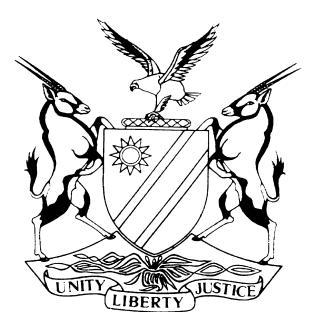REPUBLIC OF NAMIBIA


IN THE HIGH COURT OF NAMIBIA MAIN DIVISION, WINDHOEK
REVIEW JUDGMENT
Case Title: The State v Timotheus Lukas Swartbooi and Wenfred Stephanus Kooper | Case No: CR 97/2023 | |
High Court MD Review No: 1217/2023 | Division of Court: Main Division | |
Heard before: Liebenberg J et Christiaan AJ | Delivered on: 6 October 2023 | |
Neutral citation: S v Swartbooi (CR 97 /2023) [2023] NAHCMD 626 (6 October 2023) | ||
The order: The conviction and sentence are set aside. | ||
Reasons for order: | ||
LIEBENBERG J (CHRISTIAAN AJ concurring): [1] This is a review matter in terms of s 302(1) of the Criminal Procedure Act 51 of 1977 (CPA). [2] The accused persons, Timotheus Lukas Swartbooi and Wenfred Stephanus Kooper, appeared in the Magistrate’s Court for the district of Keetmanshoop. Both faced one count of contravening s 2(b), read with sections 1, 2(i) and/or 2(iv) 7, 8, 10, 14 and Part I of the schedule of the Abuse of Dependence-Producing Substances and Rehabilitation Centres Act 41 of 1971 as amended, namely possession of a dependence producing substance to wit, two grams of cannabis valued at N$100. [3] On the 2nd of March 2023, both accused persons pleaded guilty to the charge and the magistrate applied s 112(1)(a) of the CPA. Both accused were convicted and sentenced to pay a fine of N$1000 or 3 months’ imprisonment, wholly suspended for a period of 3 years, on condition that the accused persons are not convicted of possession of dependence producing substances, committed during the period of suspension. Accused 2 was further sentenced to perform 100 hours of community service at the Keetmanshoop Municipality. [4] When the matter came on review, a query was directed to the magistrate as to what satisfied the court that the accused persons knew that their actions were unlawful and had the necessary mens rea when committing the offence, when they were convicted on their mere pleas of guilty in terms of s 112(1)(a)? [5] In his response, the magistrate conceded that finalisation of drugs related matters utilising s 112(1)(a) of the CPA is wrong and that the conviction and sentence stands to be set aside. The concession by the magistrate is correctly made. The importance of questioning an accused person in terms of s 112(1)(b) is well stated in S v Nyanga1, where Moosa J stated as follows: ‘Section 112(1)(b) questioning has a twofold purpose: firstly, to establish the factual basis for the plea of guilty and, secondly, to establish the legal basis for such plea. In the first phase of the enquiry, the admissions made may not be added to by other means such as a process of inferential reasoning (S v Nkosi 1986 (2) SA 261 (T) at 263H – I; S v Mathe 1981 (3) SA 664 (NC) at 669E – G; S v Jacobs (supra at 1117B)). The second phase of the enquiry amounts essentially to a conclusion of law based on the admissions. From the admissions the court must conclude whether the legal requirements for the commission of the offence have been met. They are the questions of unlawfulness, actus reus and mens rea. These are conclusions of law. If the court is satisfied that the admissions adequately cover all the elements of the offence, the court is entitled to convict the accused on the charge to which he pleaded guilty. (See S v Lebokeng en 'n Ander 1978 (2) SA 674 (O) at 675G – H; S v Hendricks (supra at 187b – e; S v De Klerk 1992 (1) SACR 181 (W) at 183a – b; S v Diniso 1999 (1) SACR 532 (C) at 533g – h.)’ [6] In this instance, the court had to be satisfied that the accused persons knew that what was found in their possession was indeed cannabis, a prohibited dependence producing substance, as stated in S v Classen2. [7] Based on the authority cited above and the concession made, the conviction and sentence cannot stand and must be set aside. In the result, I make the following order: In respect of both accused persons, the conviction and sentence are set aside. | ||
J C LIEBENBERG JUDGE | P CHRISTIAAN ACTING JUDGE | |
1 S v Nyanga 2004 (1) SACR 198 (C) at 201b.
2S v Classen (CR 09/2022) [2022] NAHCMD 53 (11 February 2022) paras 6-10.
Cited documents 3
Legislation 2
| 1. | Criminal Procedure Act, 1977 | 1919 citations |
| 2. | Abuse of Dependence-Producing Substances and Rehabilitation Centres Act, 1971 | 190 citations |
Judgment 1
| 1. | S v Classen (CR 9 of 2022) [2022] NAHCMD 53 (11 February 2022) | 5 citations |